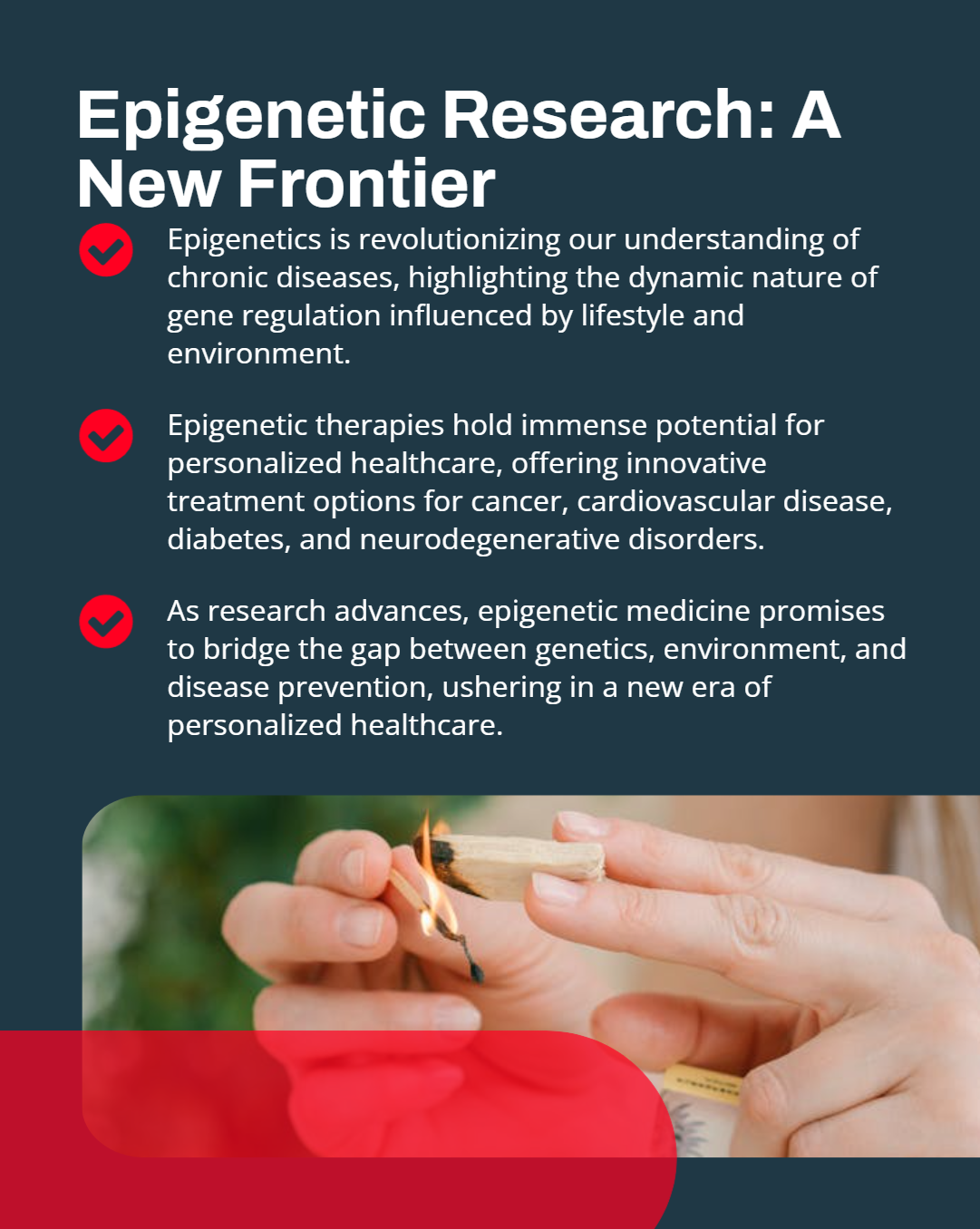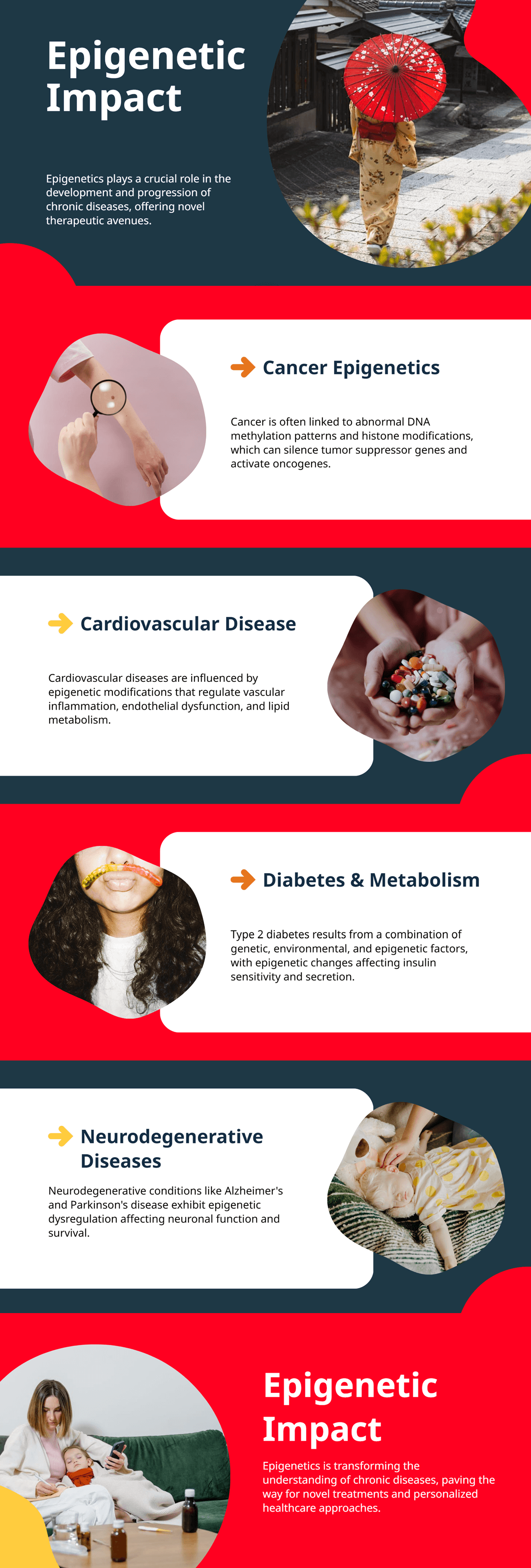Chronic diseases such as diabetes, cardiovascular disorders, cancer, and neurodegenerative conditions pose significant global health challenges. While genetic factors contribute to disease susceptibility, emerging research highlights the pivotal role of epigenetics—heritable modifications in gene expression without altering the DNA sequence. Understanding these modifications provides novel therapeutic insights that may revolutionize disease prevention and treatment.
What is Epigenetics?
Epigenetics refers to biochemical modifications that regulate gene activity without changing the underlying DNA sequence. These modifications can be influenced by environmental factors, lifestyle choices, and disease conditions. The primary epigenetic mechanisms include:
How Epigenetics Differs from Genetics
Unlike genetic mutations, epigenetic modifications are reversible and responsive to external influences. This characteristic makes epigenetic interventions a promising strategy for treating chronic diseases.

1. Epigenetics in Cancer
Cancer development is often linked to abnormal DNA methylation patterns and histone modifications, which silence tumor suppressor genes and activate oncogenes. For example:
Therapeutic Approaches
2. Epigenetics in Cardiovascular Disease
Cardiovascular diseases (CVDs) are influenced by epigenetic modifications that regulate vascular inflammation, endothelial dysfunction, and lipid metabolism. Key findings include:
Therapeutic Approaches
3. Epigenetics in Diabetes and Metabolic Disorders
Type 2 diabetes (T2D) results from a combination of genetic, environmental, and epigenetic factors. Epigenetic changes observed in diabetic patients include:
Therapeutic Approaches
4. Epigenetics in Neurodegenerative Diseases
Neurodegenerative conditions like Alzheimer’s disease (AD) and Parkinson’s disease (PD) exhibit epigenetic dysregulation affecting neuronal function and survival.
Therapeutic Approaches

1. Epigenetic Drugs
Several epigenetic drugs are in clinical development, targeting DNA methylation, histone modifications, and non-coding RNAs:
| DRUG CLASS | EXAMPLE | MECHANISM OF ACTION | DISEASE TARGET |
|---|---|---|---|
| DNMT Inhibitors | Azacitidine | Reverses abnormal methylation | Leukemia, Solid Tumors |
| HDAC Inhibitors | Vorinostat | Restores normal histone acetylation | Cancer, Neurodegenerative Diseases |
| miRNA Modulators | Anti-miR-33 | Regulates cholesterol metabolism | Cardiovascular Disease |
2. Nutritional Epigenetics
Diet plays a crucial role in modifying epigenetic markers. Certain nutrients act as epigenetic modulators:
3. Gene Editing Technologies (CRISPR-Cas9)
Advancements in CRISPR-based epigenetic editing enable precise gene regulation without altering the DNA sequence. Potential applications include:
4. Lifestyle Interventions
Physical activity and stress management influence epigenetic modifications:
Despite its promise, epigenetic therapy faces several challenges:
Future advancements will likely focus on precision epigenetics, integrating AI-driven analysis and patient-specific biomarkers for tailored interventions.

Epigenetics is transforming our understanding of chronic diseases, revealing dynamic gene regulation mechanisms influenced by lifestyle and environmental factors. By harnessing epigenetic therapy, we can develop innovative treatments for cancer, cardiovascular disease, diabetes, and neurodegenerative disorders.
With ongoing research, epigenetic-based medicine holds immense potential for personalized healthcare, bridging the gap between genetics, environment, and disease prevention.
Yes, epigenetic modifications like DNA methylation and histone acetylation are reversible, making them promising therapeutic targets.
Certain nutrients, such as folate, polyphenols, and omega-3 fatty acids, modify epigenetic markers, affecting gene expression and disease risk.
Yes, FDA-approved epigenetic drugs like Azacitidine and Vorinostat are used in cancer therapy, with more in clinical trials for various diseases.
Yes, exercise, stress reduction, and healthy diets influence epigenetic regulation, improving overall health and reducing disease risk.
Potential risks include off-target effects, unintended gene modifications, and long-term safety concerns, requiring further research.
 19.03.2025
19.03.2025